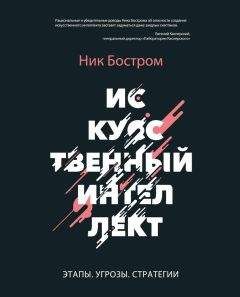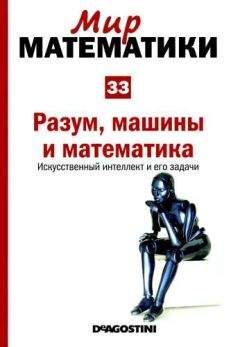Ник Бостром - Искусственный интеллект
На сайте mybooks.club вы можете бесплатно читать книги онлайн без регистрации, включая Ник Бостром - Искусственный интеллект. Жанр: Прочее издательство -,. Доступна полная версия книги с кратким содержанием для предварительного ознакомления, аннотацией (предисловием), рецензиями от других читателей и их экспертным мнением.
Кроме того, на сайте mybooks.club вы найдете множество новинок, которые стоит прочитать.

Ник Бостром - Искусственный интеллект краткое содержание
Искусственный интеллект читать онлайн бесплатно
Goodman 1954 — Goodman Nelson. Fact, Fiction, and Forecast. 1st ed. London: Athlone Press, 1954.
Gott et al. 2005 — Gott J. R., Juric M., Schlegel D., Hoyle F., Vogeley M., Tegmark M., Bahcall N., Brinkmann J. A Map of the Universe // Astrophysical Journal, 2005, 624 (2), p. 463–483.
Gottfredson 2002 — Gottfredson Linda S. G: Highly General and Highly Practical // The General Factor of Intelligence: How General Is It? / Eds. Robert J. Sternberg, Elena L. Grigorenko. Mahwah, NJ: Lawrence Erlbaum, 2002, p. 331–380.
Gould 1990 — Gould S. J. Wonderful Life: The Burgess Shale and the Nature of History. New York: Norton, 1990.
Graham 1997 — Graham Gordon. The Shape of the Past: A Philosophical Approach to History. New York: Oxford University Press, 1997.
Gray, McCormick 1996 — Gray C. M., McCormick D. A. Chattering Cells: Superficial Pyramidal Neurons Contributing to the Generation of Synchronous Oscillations in the Visual Cortex // Science, 1996, 274 (5284), p. 109–113.
Greene 2012 — Greene Kate. Intel’s Tiny Wi-Fi Chip Could Have a Big Impact // MIT Technology Review, 2012, September 21.
Guizzo 010 — Guizzo Erico. World Robot Population Reaches 8.6 Million // IEEE Spectrum, 2010, April 14.
Gunn 1982 — Gunn James E. Isaac Asimov: The Foundations of Science Fiction. Science-Fiction Writers. New York: Oxford University Press, 1982.
Haberl et al. 2007 — Haberl Helmut, Erb Karl-Heinz, Krausmann Fridolin. Global Human Appropriation of Net Primary Production (HANPP) // Encyclopedia of Earth, 2013, September 3.
Haberl et al. 2007 — Haberl H., Erb K. H., Krausmann F., Gaube V., Bondeau A., Plutzar C., Gingrich S., Lucht W., Fischer-Kowalski M. Quantifying and Mapping the Human Appropriation of Net Primary Production in Earth’s Terrestrial Ecosystems // Proceedings of the National Academy of Sciences of the United States of America, 2007, 104 (31), p. 12942–12947.
Hájek 2009 — Hájek Alan. Dutch Book Arguments // The Oxford Handbook of Rational and Social Choice / Eds. Anand Paul, Pattanaik Prasanta, Puppe Clemens. New York: Oxford University Press, 2009, p. 173–195.
Hall 2007 — Hall John Storrs. Beyond AI: Creating the Conscience of the Machine. Amherst, NY: Prometheus Books, 2007.
Hampson et al. 2012 — Hampson R. E., Song D., Chan R. H., Sweatt A. J., Riley M. R., Gerhardt G. A., Shin D. C., Marmarelis V. Z., Berger T. W., Deadwyler S. A. A Nonlinear Model for Hippocampal Cognitive Prosthesis: Memory Facilitation by Hippocampal Ensemble Stimulation // IEEE Transactions on Neural Systems and Rehabilitation Engineering, 2012, 20 (2), p. 184–197.
Hanson 1994 — Hanson Robin. If Uploads Come First: The Crack of a Future Dawn // Extropy, 1994, 6 (2).
Hanson 1995 — Hanson Robin. Could Gambling Save Science? Encouraging an Honest Consensus // Social Epistemology, 1995, 9 (1), p. 3–33.
Hanson 1998 a — Hanson Robin. Burning the Cosmic Commons: Evolutionary Strategies for Interstellar Colonization // Unpublished manuscript, 1998, July 1 (Retrieved 2012, April 26; http://hanson.gmu.edu/filluniv.pdf).
Hanson 1998 b — Hanson Robin. Economic Growth Given Machine Intelligence, 1998 (Unpublished manuscript. Retrieved 2013, May 15; http://hanson.gmu.edu/aigrow.pdf).
Hanson 1998 c — Hanson Robin. Long-Term Growth as a Sequence of Exponential Modes, 1998 (Unpublished manuscript. Last revised 2000, December; http://hanson.gmu.edu/longgrow.pdf).
Hanson 1998 d — Hanson Robin. Must Early Life Be Easy? The Rhythm of Major Evolutionary Transitions, 1998, September 23 (Unpublished manuscript. Retrieved 2012, August 12; http://hanson.gmu.edu/hardstep.pdf).
Hanson 2000 — Hanson Robin. Shall We Vote on Values, But Bet on Beliefs? 2000, September (Unpublished manuscript. Last revised 2007, October; http://hanson.gmu.edu/futarchy.pdf).
Hanson 2006 — Hanson Robin. Uncommon Priors Require Origin Disputes // Theory and Decision, 2006, 61 (4), p. 319–328.
Hanson 2008 — Hanson Robin. Economics of the Singularity // IEEE Spectrum, 2008, 45 (6), p. 45–50.
Hanson 2009 — Hanson Robin. Tiptoe or Dash to Future? // Overcoming Bias (blog), 2009, December 23.
Hanson 2012 — Hanson Robin. Envisioning the Economy, and Society, of Whole Brain Emulations. Paper presented at the AGI Impacts conference, 2012.
Hart 2008 — Hart Oliver. Economica Coase Lecture Reference Points and the Theory of the Firm // Economica, 2008, 75 (299), p. 404–411.
Hay 2005 — Hay Nicholas James. Optimal Agents // B.Sc. thesis, University of Auckland, 2005.
Hedberg 2002 — Hedberg Sara Reese. Dart: Revolutionizing Logistics Planning // IEEE Intelligent Systems, 2002, 17 (3), p. 81–83.
Helliwell et al. 2012 — Helliwell John, Layard Richard, Sachs Jeffrey. World Happiness Report. The Earth Institute. 2012.
Helmstaedter et al. 2011 — Helmstaedter M., Briggman K. L., Denk W. High-Accuracy Neurite Reconstruction for High-Throughput Neuroanatomy // Nature Neuroscience, 2011, 14 (8), p. 1081–1088.
Heyl 2005 — Heyl Jeremy S. The Long-Term Future of Space Travel // Physical Review D, 2005, 72 (10), p. 1–4.
Hibbard 2011 — Hibbard Bill. Measuring Agent Intelligence via Hierarchies of Environments // Artificial General Intelligence: 4th International Conference, AGI 2011, Mountain View, CA, USA, August 3–6, 2011. Proceedings / Eds. Jürgen Schmidhuber, Kristinn R. Thórisson, Moshe Looks. Lecture Notes in Computer Science 6830. Berlin: Springer, 2011, p. 303–308.
Hinke et al. 1993 — Hinke R. M., Hu X., Stillman A. E., Herkle H., Salmi R., Ugurbil K. Functional Magnetic Resonance Imaging of Broca’s Area During Internal Speech // Neuroreport, 1993, 4 (6), p. 675–678.
Hinxton Group, 2008 — Consensus Statement: Science, Ethics and Policy Challenges of Pluripotent Stem Cell-Derived Gametes. Hinxton, Cambridgeshire, UK, 2008, April 11 (http://www.hinxtongroup.org/Consensus_HG08_FINAL.pdf).
Hoffman 2009 — Hoffman David E. The Dead Hand: The Untold Story of the Cold War Arms Race and Its Dangerous Legacy. New York: Doubleday, 2009.
Hofstadter 1999 — Hofstadter Douglas R. Gödel, Escher, Bach: An Eternal Golden Braid. New York: Basic Books, 1999 [1979].
Holley 2009 — Holley Rose. How Good Can It Get? Analysing and Improving OCR Accuracy in Large Scale Historic Newspaper Digitisation Programs // D-Lib Magazine, 2009, 15 (3–4).
Horton et al. 2008 — Horton Sue, Alderman Harold, Rivera Juan A. Copenhagen Consensus 2008 Challenge Paper: Hunger and Malnutrition. Technical report. Copenhagen Consensus Center, 2008, May 11.
Howson, Urbach 1993 — Howson Colin, Urbach Peter. Scientific Reasoning: The Bayesian Approach. 2nd ed. Chicago: Open Court, 1993.
Hsu 2012 — Hsu Stephen. Investigating the Genetic Basis for Intelligence and Other Quantitative Traits. Lecture given at UC Davis Department of Physics Colloquium, Davis, CA, 2012, February 13.
Huebner 2008 — Huebner Bryce. Do You See What We See? An Investigation of an Argument Against Collective Representation // Philosophical Psychology, 2008, 21 (1), p. 91–112.
Huff et al. 2010 — Huff C. D., Xing J., Rogers A. R., Witherspoon D., Jorde L. B. Mobile Elements Reveal Small Population Size in the Ancient Ancestors of Homo Sapiens // Proceedings of the National Academy of Sciences of the United States of America, 2010, 107 (5), p. 2147–2152.
Huffman, Pless 2003 — Huffman W. Cary, Pless Vera. Fundamentals of Error-Correcting Codes. New York: Cambridge University Press, 2003.
Hunt 2011 — Hunt Patrick. Late Roman Silk: Smuggling and Espionage in the 6th Century CE // Philolog, Stanford University (blog), 2011, August 2.
Hutter 2001 — Hutter Marcus. Towards a Universal Theory of Artificial Intelligence Based on Algorithmic Probability and Sequential Decisions // Machine Learning: ECML 2001: 12th European Conference on Machine Learning, Freiburg, Germany, September 5–7, 2001. Proceedings / Eds. Luc De Raedt, Peter Flach. Lecture Notes in Computer Science 2167. New York: Springer, 2001, p. 226–238.
Hutter 2005 — Hutter Marcus. Universal Artificial Intelligence: Sequential Decisions Based On Algorithmic Probability. Texts in Theoretical Computer Science. Berlin: Springer, 2005.
Iliadou et al. 2011 — Iliadou A. N., Janson P. C., Cnattingius S. Epigenetics and Assisted Reproductive Technology // Journal of Internal Medicine, 2011, 270 (5), p. 414–420.
Isaksson 2007 — Isaksson Anders. Productivity and Aggregate Growth: A Global Picture. Technical report 05/2007. Vienna, Austria: UNIDO (United Nations Industrial Development Organization) Research and Statistics Branch, 2007.
Jones 2009 — Jones Garret. Artificial Intelligence and Economic Growth: A Few Finger-Exercises, 2009, January (Unpublished manuscript. Retrieved 2012, November 5; http://mason.gmu.edu/~gjonesb/AIandGrowth).
Jones 1985 — Jones Vincent C. Manhattan: The Army and the Atomic Bomb. United States Army in World War II. Washington, DC: Center of Military History, 1985.
Joyce 1999 — Joyce James M. The Foundations of Causal Decision Theory. Cambridge Studies in Probability, Induction and Decision Theory. New York: Cambridge University Press, 1999.
Judd et al. 2012 — Judd K. L., Schmedders K., Yeltekin S. Optimal Rules for Patent Races // International Economic Review, 2012, 53 (1), p. 23–52.
Kalfoglou et al. 2004 — Kalfoglou A., Suthers K., Scott J., Hudson K. Reproductive Genetic Testing: What America Thinks. Genetics and Public Policy Center, 2004.
Kamm 2007 — Kamm Frances M. Intricate Ethics: Rights, Responsibilities, and Permissible Harm. Oxford Ethics Series. New York: Oxford University Press, 2007.
Kandel et al. 2000 — Principles of Neural Science / Eds. Eric Kandel, James Schwartz, Thomas Jessell. 4th ed. New York: McGraw-Hill, 2000.
Kansa 2003 — Kansa Eric. Social Complexity and Flamboyant Display in Competition: More Thoughts on the Fermi Paradox, 2003 (Unpublished manuscript, archived version).
Karnofsky 2012 — Karnofsky Holden. Comment on «Reply to Holden on Tool AI» // Less Wrong (blog), 2012, August 1.
Kasparov 1996 — Kasparov Garry. The Day That I Sensed a New Kind of Intelligence // Time, 1996, March 25, no. 13.
Kaufman 2011 — Kaufman Jeff. Whole Brain Emulation and Nematodes // Jeff Kaufman’s Blog (blog), 2011, November 2.
Keim et al. 1999 — Keim G. A., Shazeer N. M., Littman M. L., Agarwal S., Cheves C. M., Fitzgerald J., Grosland J., Jiang F., Pollard S., Weinmeister K. Proverb: The Probabilistic Cruciverbalist // Proceedings of the Sixteenth National Conference on Artificial Intelligence. Menlo Park, CA: AAAI Press, 1999, p. 710–717.
Kell et al. 2013 — Kell Harrison J., Lubinski David, Benbow Camilla P. Who Rises to the Top? Early Indicators // Psychological Science, 2013, 24 (5), p. 648–659.
Keller 2004 — Keller Wolfgang. International Technology Diffusion // Journal of Economic Literature, 2004, 42 (3), p. 752–782.
KGS, 2012 — KGS Game Archives: Games of KGS player zen19 // KGS Go Server, 2012 (Retrieved 2013, July 22; http://www.gokgs.com/gameArchives.jsp? user=zen19d&oldAccounts=t&year=2012&month=3).
Knill et al. 2000 — Knill Emanuel, Laflamme Raymond, Viola Lorenza. Theory of Quantum Error Correction for General Noise // Physical Review Letters, 2000, 84 (11), p. 2525–2528.
Koch et al. 2006 — Koch K., McLean J., Segev R., Freed M. A., Berry M. J., Balasubramanian V., Sterling P. How Much the Eye Tells the Brain // Current Biology, 2006, 16 (14), p. 1428–1434.
Kong et al. 2012 — Kong A., Frigge M. L., Masson G., Besenbacher S., Sulem P., Magnusson G., Gudjonsson S. A., Sigurdsson A. Rate of De Novo Mutations and the Importance of Father’s Age to Disease Risk // Nature, 2012, 488, p. 471–475.
Koomey 2011 — Koomey Jonathan G. Growth in Data Center Electricity Use 2005 to 2010. Technical report, 08/01/2011. Oakland, CA: Analytics Press, 2011.
Koubi 1999 — Koubi Vally. Military Technology Races // International Organization, 1999, 53 (3), p. 537–565.
Koubi, Lalman 2007 — Koubi Vally, Lalman David. Distribution of Power and Military R&D // Journal of Theoretical Politics, 2007, 19 (2), p. 133–152.
Koza et al. 2003 — Koza J. R., Keane M. A., Streeter M. J., Mydlowec W., Yu J., Lanza G. Genetic Programming IV: Routine Human-Competitive Machine Intelligence. 2nd ed. Genetic Programming. Norwell, MA: Kluwer Academic, 2003.
Kremer 1993 — Kremer Michael. Population Growth and Technological Change: One Million B.C. to 1990 // Quarterly Journal of Economics, 1993, 108 (3), p. 681–716.
Kruel 2011 — Kruel Alexander. Interview Series on Risks from AI // Less Wrong Wiki (blog), 2011 (Retrieved 2013, Oct. 26; http://wiki.lesswrong.com/wiki/Interview_series_on_risks_from_AI).
Kruel 2012 — Kruel Alexander. Q&A with Experts on Risks From AI #2 // Less Wrong (blog), 2012, January 9.
Krusienski, Shih 2011 — Krusienski D. J., Shih J. J. Control of a Visual Keyboard Using an Electrocorticographic Brain-Computer Interface // Neurorehabilitation and Neural Repair, 2011, 25 (4), p. 323–331.
Kuhn 1962 — Kuhn Thomas S. The Structure of Scientific Revolutions. 1st ed. Chicago: University of Chicago Press, 1962.
Kuipers 2012 — Kuipers Benjamin. An Existing, Ecologically-Successful Genus of Collectively Intelligent Artificial Creatures. Paper presented at the 4th International Conference, ICCCI 2012, Ho Chi Minh City, Vietnam, 2012, November 28–30.
Kurzweil 2001 — Kurzweil Ray. Response to Stephen Hawking // Kurzweil Accelerating Intelligence, 2001, September 5 (Retrieved 2012, December 31; http://www.kurzweilai.net/response-to-stephen-hawking).
Kurzweil 2005 — Kurzweil Ray. The Singularity Is Near: When Humans Transcend Biology. New York: Viking, 2005.
Похожие книги на "Искусственный интеллект", Ник Бостром
Ник Бостром читать все книги автора по порядку
Ник Бостром - все книги автора в одном месте читать по порядку полные версии на сайте онлайн библиотеки mybooks.club.




